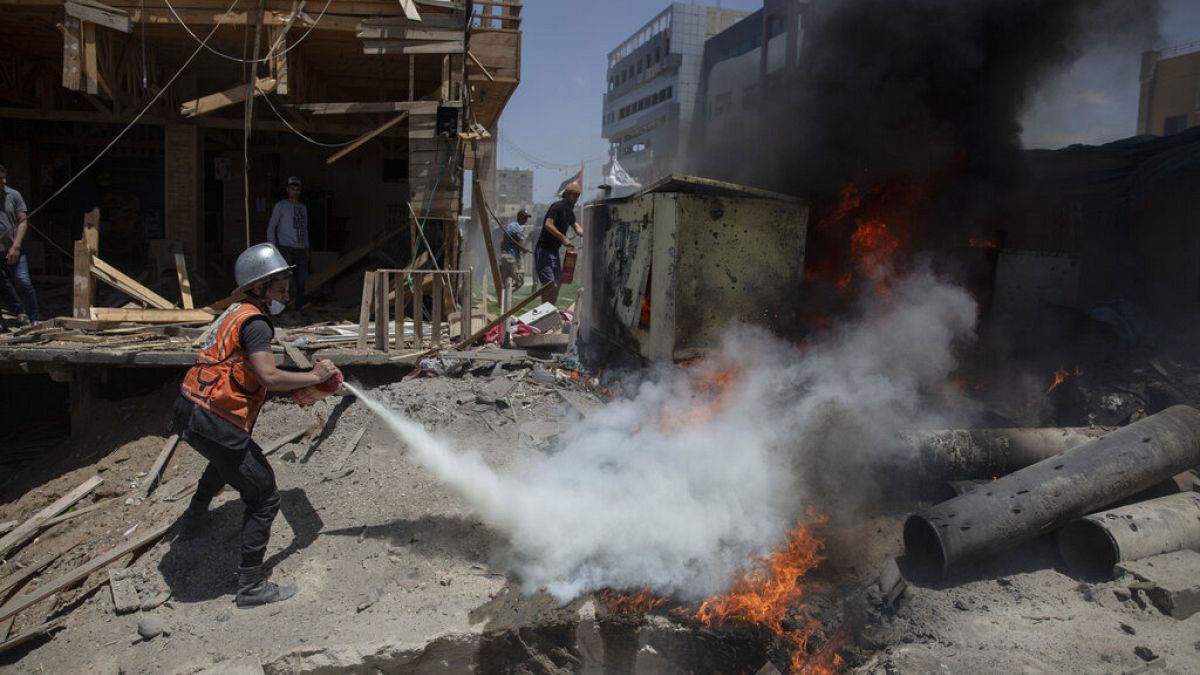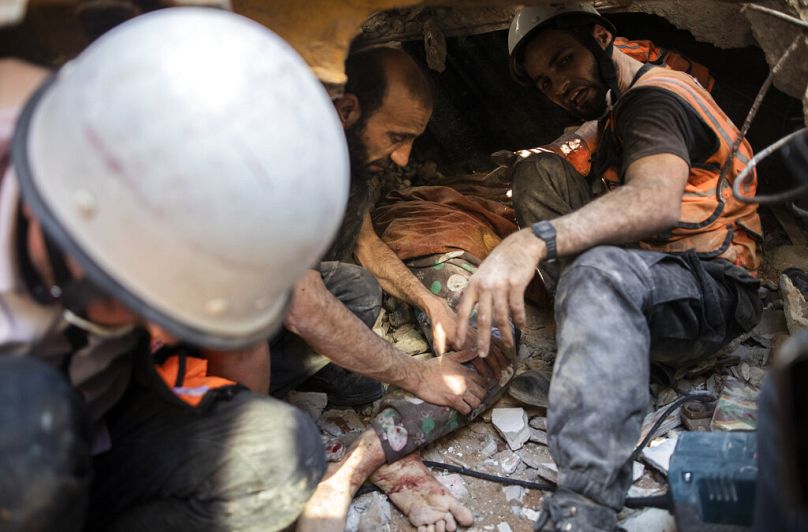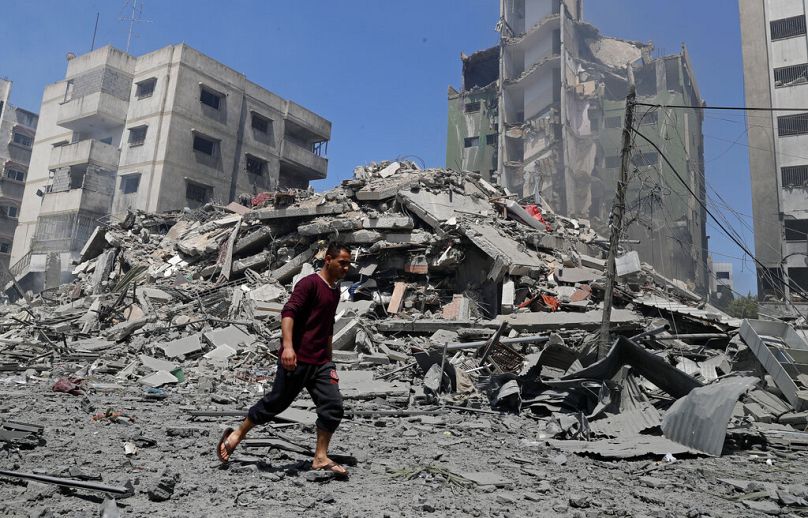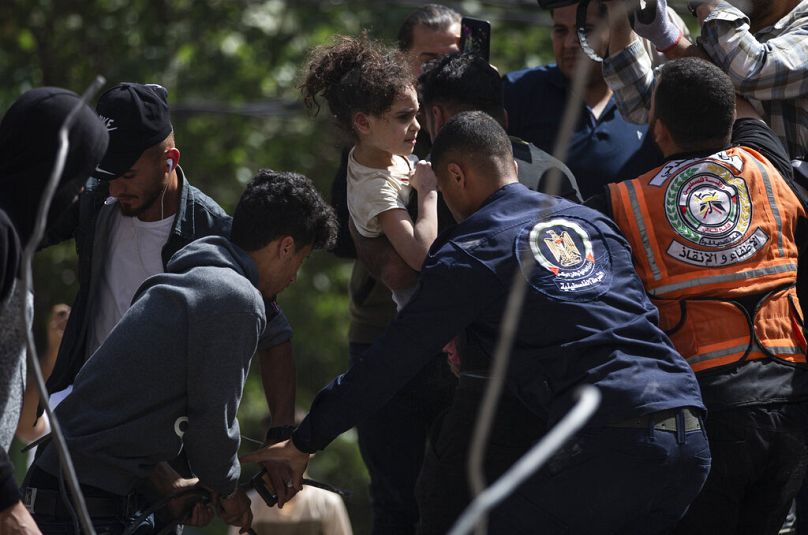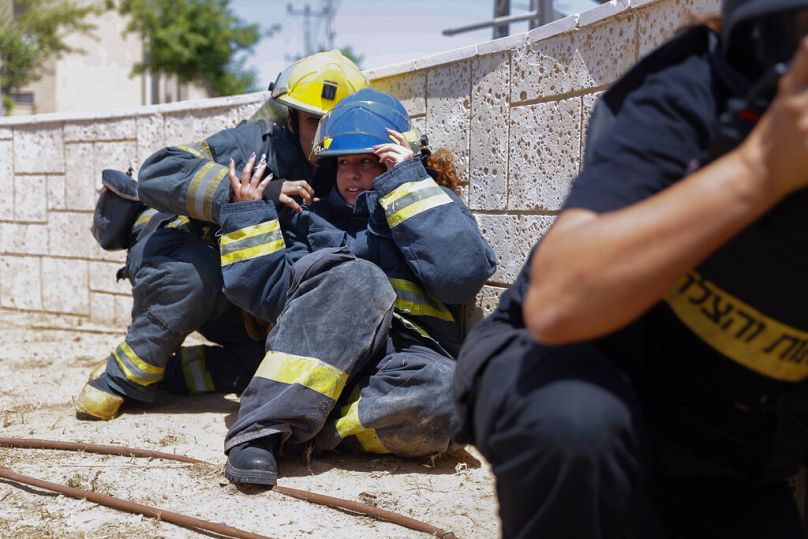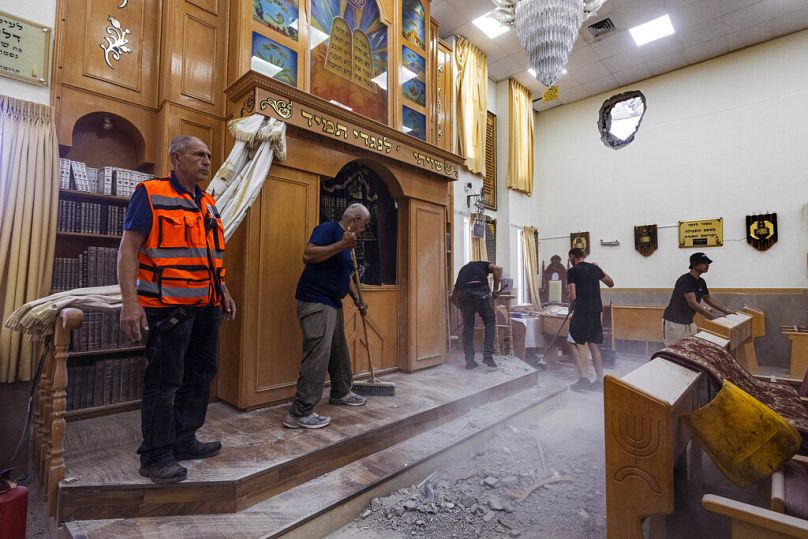As the conflict entered its second week on Monday, violence showed no signs of easing with heavy Israeli airstrikes in Gaza and continued rocket fire from Hamas in southern Israel.
Israel launched another wave of airstrikes on the Gaza Strip on Monday as fighting entered its second week, showing no signs of easing despite international calls for a ceasefire.
Hamas continued to fire scores of rockets from the Gaza strip to Southern Israel.
Prime Minister Benjamin Netanyahu met with top security officials on Monday evening and later said Israel would "continue to strike terror targets'' in Gaza.
"We will continue to operate as long as necessary in order to return calm and security to all Israeli citizens,'' he said.
The Israeli military said it destroyed 15 kilometres of militant tunnels and the homes of nine Hamas commanders in an early morning barrage on Monday. No reports on casualties were immediately available.
Later on Monday, it destroyed the building housing the headquarters of the Hamas-run Religious Affairs Ministry, with an airstrike.
It came after the conflict's deadliest day in Gaza, as Israeli strikes on Sunday destroyed three buildings and killed at least 42 people on Sunday.
The Gaza Health Ministry said at least 16 women and 10 children were among those killed, with another 50 people wounded in the attack and dozens pulled from the rubble.
At least 200 Palestinians have been killed in the strikes as of Monday, including 59 children and 35 women, with 1,300 people wounded, according to the Gaza Health Ministry.
10 Israelis have been killed by some of the 3,100 rockets launched by Hamas, among them a soldier and a five-year-old boy.
The airstrike at about 1 am on Sunday hit a busy downtown street filled with residential buildings and shops that the IDF said contained a weapons warehouse and the home of the main Hamas leader still in Gaza, Yehiyeh Sinwar, who is thought to have gone into hiding.
In the space of about five minutes two buildings next to each other, and one about 50 metres further down the road, was destroyed.
Hamas also continued to launch rockets from civilian areas in Gaza toward civilian areas in Israel on Sunday. One rocket slammed into a synagogue in the southern city of Ashkelon hours before evening services for the Jewish holiday of Shavuot
A separate strike announced by the IDF reduced a building that housed media organisations including the Associated Press and Al-Jazeera to rubble.
Antony Blinken, the secretary of state in Joe Biden’s administration, said on Monday he had asked Israel for any evidence for its claim that Hamas was operating in the building, but that he personally has “not seen any information provided.”
Amnesty International has sounded the alarm over possible war crimes being committed in the Gaza Strip, including the apparent targeting of civilians and a media building, and called on the International Criminal Court to investigate.
"We are deeply concerned about the mounting death toll," the human rights organisation said in a tweet on Sunday, adding: "Direct attacks on civilians are war crimes.”
The strikes on Monday morning heavily damaged a three-story building in Gaza City, but residents said the military warned them 10 minutes before the strike, and the building was cleared.
They said many of the airstrikes hit nearby farmland.
Gaza’s mayor, Yahya Sarraj, told Al-Jazeera TV that the strikes had caused extensive damage to roads and other infrastructure. “If the aggression continues we expect conditions to become worse,” he said.
Israel said it struck nine houses in different parts of northern Gaza that belonged to “high-ranking commanders” in Hamas, the Islamic militant group that has controlled the territory since seizing power from rival Palestinian forces in 2007.
While international diplomats work to try to bring a halt to the fighting, the US said it was ready to provide support “if the parties want to reach a ceasefire”.
Blinken called on both sides to “protect civilians and particularly children”, but reiterated the US’s support for Israel’s right "to defend itself".
German Chancellor Angela Merkel spoke with Netanyahu on Monday on the phone, expressing “solidarity” and condemning the rocket attacks out of Gaza.
Her spokesman, Steffen Seibert, said she called for the hostilities to “end as soon as possible”.
French President Emmanuel Macron, alongside Egyptian counterpart Abdel Fattah el-Sissi with whom he was meeting in Paris, stressed “the absolute necessity of ending hostilities.”
Islamic nations denounce Israel in a joint statement
Israel is thought to have stepped up air raids in recent days to inflict as much damage as possible on Hamas while international mediators are trying to broker a ceasefire.
An American diplomat is in the region to try to de-escalate tensions, and the U.N. Security Council was set to meet on Sunday.
Chinese Foreign Minister Wang Yi has called on the Council to seek an early de-escalation and in a phone conversation with Pakistan's Foreign Minister, blamed the US for UN inaction to date.
Also on Sunday, the 57-nation Organisation of Islamic Cooperation held an emergency meeting to discuss how to address the conflict in the first major move by Islamic countries to present a unified front.
The Saudi-based group issued a joint statement condemning "barbaric attacks" by Israel "in the strongest terms" and warned against what it termed a "continued and deliberate inflammation and provocation of the religious sensibilities and feelings of the Palestinian people and the Islamic Ummah [community]".
Member states also called on Israel to respect Muslims' access to Al-Aqsa Mosque, the third-holiest site in Islam, as well as stop settlers from forcibly evicting Palestinian families from their homes, and called again for a two-state solution to the wider conflict with East Jerusalem as Palestine's capital.
Reactions to the fighting have been mixed across the Arabian Peninsula, North Africa and the Gulf states. In Qatar, a speech by Hamas’ top leader Ismail Haniyeh was broadcast on Saturday. Haniyeh now splits his time between Turkey and Qatar, both of which back Hamas.
“The resistance will not give in,” Haniyeh said in the speech, adding that “resistance is the shortest road to Jerusalem” and that Palestinians will not accept anything less than a Palestinian state with Jerusalem as its capital.
Kuwait's parliament speaker reportedly spoke with Haniyeh on Saturday, as did Gen. Esmail Ghaani, the head of the expeditionary Quds Force of Iran's paramilitary Islamic Revolutionary Guard Corps.
Other states, however, such as Bahrain, the UAE and Morocco, signed recognition agreements with Israel last year in the waning days of the Trump administration.
This was a source of contention during the Organization of Islamic Cooperation's video call, with the foreign ministers of Iran and Turkey castigating those states. The latter, Mevlut Cavusoglu, said: “If there are half-hearted statements within our own family, how could we criticize others? Who will take our words seriously?”
An unnamed Egyptian diplomat involved in negotiations with Hamas told AP that the total destruction of Hamas’ rocket capabilities would require a ground invasion that would “inflame the whole region”. He added that Egypt, which made peace with Israel decades ago, has threatened to “suspend” cooperation with Israel in various fields.
Elsewhere, foreign ministers from European Union member states will convene for an extraordinary meeting on Tuesday "in view of the ongoing escalation" and the "unacceptable number of civilian casualties," the bloc's top diplomat Josep Borrell announced on Sunday.
"We will coordinate and discuss how the EU can best contribute to end the current violence," he said on Twitter.
Netanyahu insists shelling of targets in Gaza will continue
Speaking to American channel CBS's Face the Nation programme earlier on Sunday, Netanyahu doubled down on the IDF's claim that the Gaza media building destroyed on Saturday also housed a Hamas office and had been a "perfectly legitimate target".
Asked if he had provided any evidence of this to President Joe Biden during a call on Saturday, Netanyahu said: “We pass it through our intelligence people.”
Netanyahu gave no time frame for when Israel would be ready to halt its side of the fighting after nearly a week of Israeli air strikes and Hamas rocket barrages. “We hope that it doesn’t continue very long, but we were attacked by Hamas,” he said.
It came after Netanyahu vowed on Saturday that the IDF would "continue to respond forcefully" to rocket attacks from Hamas in Gaza. In a televised address, he had again blamed Hamas for the latest bout of deadly violence, which entered its seventh day on Sunday.
"This past week," he said, "millions of Israelis were forced into bomb shelters as missiles rained down on our cities. Several Israelis have been killed. Many more have been wounded."
"Israel will not tolerate this. Israel has responded forcefully to these attacks and we will continue to respond forcefully until the security of our people is reinstated and restored."
The week of deadly violence was set off by a Hamas rocket attack on Jerusalem, following weeks of mounting tensions that spilled over into fighting after Israeli officers forcibly evicted Palestinians from their homes in contested East Jerusalem and stormed Al-Aqsa Mosque.
Since then, Hamas has fired more than 2,000 rockets on Israel, most have either fallen short or been intercepted by the country's Iron Dome anti-missile air defence system.
Israel's warplanes and artillery have struck hundreds of targets around Gaza, where some two million Palestinians live, with ground forces amassing near the border.
The huge airstrike on Sunday made a crater in the ground that blocked one of the main roads leading to Shifa Hospital, the largest medical centre in the Gaza Strip.
Israeli police also said a Palestinian driver had rammed into an Israeli checkpoint in the East Jerusalem neighbourhood of Sheikh Jarrah on Sunday, injuring six officers before being shot and killed.
Sheikh Jarrah is the neighbourhood where Palestinian families had been threatened with eviction before the violence broke out.
Chris Doyle is Director of the Council on Arab-British Understanding, a not-for-profit organisation that promotes conflict resolution and human rights policy. He says the end of the current fighting won't mean the end of the conflict:
"We do know that at some point - probably this week - the rockets and the missiles will go silent. But it will be calm for Israelis, not for Palestinians. It will be peace for Israelis, but not for Palestinians. And that is the fundamental flaw in the way the international community goes about this. We've seen this so many times before. Each and every time the international community's attention goes away as soon as there's a ceasefire. But calm for Palestinians means the end of the blockade of the Gaza Strip. It means that the 2 million civilians who live there are able to travel, are able to carry out economic activity normally, that they will have some hope on the horizon...That is what we really need to understand as peace."
Listen to our full interview with Chris Doyle by clicking on the media player above.
